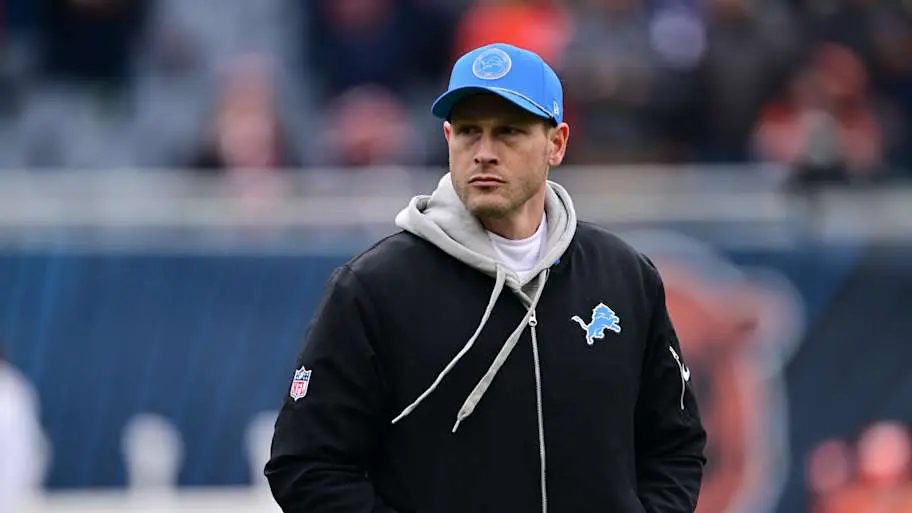Bears’ Ben Johnson Reflects on Last Season’s Interviews: ‘I Wasn’t Ready to Open Up’
The recent hiring of Ben Johnson as the head coach of the Chicago Bears has sent waves through the football community. Transitioning from being the offensive coordinator of the Detroit Lions to leading a team in the same division, Johnson’s journey is one of resilience and self-discovery. After a heart-wrenching exit from the playoffs with the Lions, he reflects on not just the decisions made on the field but also the emotional toll they take off it.
Johnson, who was instrumental in giving the Lions a powerful offensive identity over the past three seasons, found himself at a crossroads after last season’s NFC Championship loss against the 49ers. His remarks about feeling unprepared emotionally to separate from Detroit highlight a key aspect of being a coach; the mental readiness to embrace change and new challenges. This feeling of unpreparedness is not just a personal sentiment but resonates with many athletes and coaches who grapple with the emotional side of sports.
Emotional Preparedness in Sports
Understanding emotional preparedness is crucial in today’s sports landscape. Coaches like Ben Johnson often face immense pressure to perform, not only for themselves but for their players, fans, and organizations. Johnson’s journey reflects a common struggle among coaches—balancing personal feelings with professional obligations. During his interview, he candidly stated, “The year before, I wasn’t emotionally available yet.” This admission speaks volumes about his growth and willingness to learn from past experiences.
Taking a moment to look back can often provide the insight needed to move forward. Coaches heavily invested in their teams face unique challenges. They must manage their emotions while also inspiring their players. Johnson’s acknowledgment of his readiness shows that acknowledging vulnerabilities can be a strength, especially when moving into new environments.

Lessons from Previous Teams
The transition from the Lions to the Bears involves not only a change of scenery but a shift in mindset. With the Lions, Johnson built a formidable offense that thrived in the 2023 season. The fact that he was able to reflect on his emotional readiness speaks to his desire to excel at what he does. The way the Lions concluded their season—a heartbreaking loss—has left him with a sense of unfinished business.
This sentiment often carries over into new roles. It’s not unusual for a coach to desire to right past wrongs, leveraging lessons learned to influence future success. Johnson understood that his past experiences would shape his new responsibilities as Bears’ head coach. His friendship with Lions’ head coach Dan Campbell has been pivotal, serving as a mentor and sounding board during this transformative period. Johnson’s respect for Campbell resonates through his comments, emphasizing the importance of strong relationships in sports.
The Future of the Chicago Bears
Now, stepping into the role of Bears’ head coach, Johnson is about to embark on a journey with a team that has its share of challenges. The Bears have experienced fluctuating success over recent seasons and are in the rebuilding phase. Johnson is set on maintaining a clear vision for the team’s future, which involves accountability and discipline—a stark contrast to how previous seasons unfolded.
During his introductory press conference, he emphasized the importance of developing a winning culture. Johnson expressed his excitement about collaborating with Ryan Poles, the Bears’ general manager, stating, “We have to work together to achieve our goals.” With dual expectations for performance and growth, Johnson’s strong foundation from his time with the Lions will likely prove beneficial as he takes the reins in Chicago. The focus will be on building a program dedicated to growth and winning, which resonates with the passionate fanbase.

Overcoming Division Rivalries
Upon joining the Bears, Johnson faces the challenge of navigating the fierce rivalries of the NFC North. Historically known for its competitiveness, this division is filled with storied franchises and skilled coaching. Despite his earlier loyalties to the Lions, the prospect of leading a rival team offers an intriguing challenge. Fans of the Lions have expressed disappointment at Johnson’s move within the division, often dubbing him “Benedict Johnson” for his sudden shift. However, true understanding of the coaching landscape reveals that these moves are often rooted in strategic thinking and ambitions of success.
Coaches carry the weight of their decisions, often needing to establish their identities in new environments. Johnson’s stint with the Lions allowed him to see firsthand the strengths and weaknesses of his rivals. His focused mindset and deep desire to improve the Bears will be crucial, especially in the matchup against formidable opponents. “I know this is the toughest division in football right now,” he asserted.
Building Relationships with Players
Creating lasting relationships with players is vital for any head coach’s success. From the onset, Ben Johnson has emphasized his commitment to connecting with the Bears’ roster. Establishing trust and fostering an open environment can lead to better morale and performance on the field. As a young coach coming into a leadership role, engaging players through interpersonal relationships will help develop a solid team dynamic.
Accountability and discipline are themes that Johnson has stressed repeatedly. He recognizes that building a winning culture requires empowering players, as well as holding them accountable for their actions. Balancing an authoritative approach with player support is essential in today’s competitive atmosphere.

The Importance of Communication
Effective communication is vital for a coach looking to create a successful team environment. Johnson’s ability to articulate his vision and foster open dialogues with players will be pivotal. Clear communication paves the way for better understanding and alignment within the squad. Over his tenure with the Lions, he learned the importance of relaying strategies without overwhelming his players, a skill he aims to bring to Chicago.
Fostering an open-door policy encourages players to voice their concerns, seek advice, and share thoughts about game strategies. Emphasizing this practice can lead to improved player confidence, ultimately resulting in better on-field performance. As the culture within the Bears shifts under Johnson’s leadership, communication will be a cornerstone of the new era.

Final Thoughts on the Leadership Transition
Ben Johnson’s transition from being the offensive coordinator for the Lions to the head coach of the Bears marks the start of a new chapter for both him and the team. As he embarks on this journey, his reflections on past experiences and emotional readiness provide a strong foundation. By focusing on employee well-being and establishing trust, he aims to create a winning culture that aligns with the passionate Bears fanbase.
The upcoming seasons may pose challenges, but with Johnson’s strategic vision and commitment to communication, hope arises for a brighter future in Chicago. His ambitious approach, shaped by lessons learned in Detroit, showcases his readiness to embrace both challenges and victories as he leads the Bears forward.

Hi there! I’m Jade, a 38-year-old gossip journalist with a passion for uncovering the juiciest stories in the world of celebrity news. With years of experience in the industry, I love sharing the latest trends and insider scoops.



